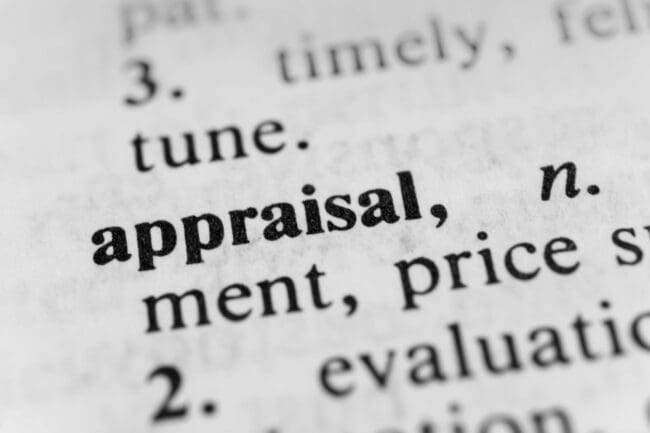Watch Jeff Gabriel explain domain appraisals in this Saw.com video.
My name is Jeff Gabriel. I am the CEO and co-founder of Saw.com. In my tenure, I’ve had the opportunity to appraise tens of thousands of domain names, and I’m going to share with you today some of the metrics and things that I do to quickly and easily appraise a domain.
I’ve had the opportunity to teach many different salespeople in our industry about appraising domain names. And one of the things I do, when I’m teaching people is to create analogies. One of the analogies I use a lot is one with real estate. And a domain appraisal is very similar to that. Domain investors want to be sure they make smart investments, so getting an accurate domain value is important whether you’re buying or selling.
Domain Appraisal and Valuation

There are many metrics that a real estate appraiser uses to put a value on a home. Well, that’s very similar to a domain value. Instead of square footage, we look at the extension it falls into. Instead of the location of the property, we might look at the industry that that name might target. And also, when it comes to real estate, they talk about the highest and best use for the name. And most important is comparable sales to that property. Well, the same thing falls into that when it comes to a URL. Comparable domain sales influence a domain’s worth, alongside things like domain age, keyword usage, website rankings/search engine optimization (SEO), and organic traffic.
Some of the parameters that I’m going to look at and go into might be very obvious to some, but others may be surprised. You might be saying, “Wow, I didn’t think about that.” And since domain appraisal is not something you have to go to get a license for, there are a lot of different ways people look at domain names to appraise them. Here are various things appraisers look at when determining the value of a domain.
Domain Estimation
The domain analysis starting point I use to determine the value of your domain is I’m going to look at the extension, aka top-level domain, or TLD. What is the domain extension? Well, you can look at the com, the net, or the org. We look at different CCTLDs; co.uk .de .inc for GTLDs .xyz or even .auto.

And from there, what I try to do, which is the easiest thing to do, is compare whatever those extensions are to a dot com, which I consider the gold standard for a domain’s worth.
You try to make a proportionate value. So if the domain is a .com, that’s a positive. If it’s a dot net, well, I would probably try to appraise the domain, in my mind, as a dot com because it’s so much easier because there’s such a wealth of information about past sales and other metrics of the dot com and then try to assess value by basing it on the dot net values of the industry.
What does that mean? If I have a domain name like cars.net I’m going to pretend I’m appraising cars.com, and then I’m going to say ok, a .net is worth roughly 10 percent of a .com, and that’s how I’m going to come to that domain’s value.
Industry
So after we get past the extension part, we are going to look at the industry the domain falls into, as this also influences the value of a domain. And one of the questions that people ask me is, they say “Jeff, the domain name that I’m looking to appraise falls into different industries.”
My suggestion to you is to focus on the industry that has the highest demand and not look at the other industries it might fall into. For example, a very generic domain name that might fall into multiple industries would be card.com. You can think of different uses for the word card, but the one for this purpose is, I would say, finance.
That’s because there are so many players fighting for that term credit card out there. So the industry that it falls into is very important. Some industries where it’s most competitive are the obvious ones; insurance, credit cards, and travel. Any time you turn on your TV you’re going to see advertisements having to do with those industries. That tells me there is a lot of demand for that particular domain, which increases the domain’s value.
Domain Length
One of the things we look at next is the length of the domain name. One of those things is looking at the number of characters. Let’s look at one of the most perfect domains in the world, yoga.com, it’s only four letters. That is a very short domain.
Now if we start adding in Bikram yoga, or hot yoga, those are all different types of yoga, but it starts to get longer, starts to get harder to spell, and starts to get harder to remember. It gets harder to market for those who walk past a billboard to read it, ingest it, and tell others about it. So, the length has a lot to do with the value of the domain name.
Now what ties into the length of the domain name, it’s kind of an easy high to look at, but it’s kind of an opinion call. It takes a lot of common sense to look at. The question is how memorable is it and whether it will pass the radio test. So the question is, how will it sound on the radio? How will it be perceived by your listeners?
And when we are talking about the radio test we are also talking about putting it in a video, putting it on a business card, verbally telling somebody the name of your business at a conference. Will they remember it? Will they go back and spell it?
Can a family or people who purchase your goods or services go out to dinner with friends and say it and remember the name of your business and send you that business?
Universal Branding
From there, the next question is if you’re looking to become a worldwide brand, how universally is it in many different languages? Going back to my example of yoga.com. Yoga is yoga in Spanish, Yoga is yoga in German, and Yoga is yoga in Mandarin. So opening a brand that focuses on many different markets and languages, that domain name is as close to perfect as you are going to get.
Looking at an opportunity to purchase shoes.com, that’s another short, perfect domain name with plenty of search volume. However, when you get into the Spanish-speaking market, that is “zapatos,” and if you look at it in German, it’s a different word, and there’re many different other ways to look at it, so it limits you comparing that to yoga.
The more universal the branding is, the higher the domain’s value. Short, easy-to-remember, and easy-to-spell domains are considered premium domains.
Is it Easy to Spell?
And then tying into how the length and how universal it is, how easy it is to spell. The domain name achieve.com would be wonderful, but would people mix up the “e” and the “i”? How does it sound to somebody who doesn’t speak English as their first language? Are they going to have a hard time spelling it?
There are a lot of people who come to me and ask me to appraise domain names or ask me to help them acquire domain names, where instead of using the letter “s” at the end, they use the letter “z” and pronounce it as plural. What does that do to your business with the radio test with people making it memorable? It doesn’t help.
Comparable Sales of Similar Domains
So one of the most important parts of the appraisal process is looking at comparable past sales that have happened in the market in a reasonable time of the sale taking place.
So looking at sales that happened in 2003 usually isn’t very relevant. One of the things that you have to think about is you can’t just take the term that your domain name or anyone’s domain name falls into, for that matter, and search that term. Then, anything that term falls into is now a legitimate comparable sale. That is not the case.
Pizza.com, pizza is something that everybody loves to eat. When you say the word pizza, a lot of people smile and say, “When are we going to get it?” But if you say Jimmy’s Pizza, that is not a relevant comparable sale. If that sold for, say, $5,000, that is not a relevant comparable sale to the term pizza.com, which sold a few years ago for a few million dollars. Not comparable.
If you’d like to learn more about appraising domain names or anything about domain names, you can go to Saw.com and click on our resources button, and there’s plenty of information there that you can learn about domains or anything having to do with it. If you’d like to suggest what we can talk about next time please go to our Contact Us section and say it, or maybe even request a domain you’d like to be appraised that I can do live.
Want to find out how much your domain is worth? Our domain appraisal service and free appraisal tool will help you determine reasonable pricing.
